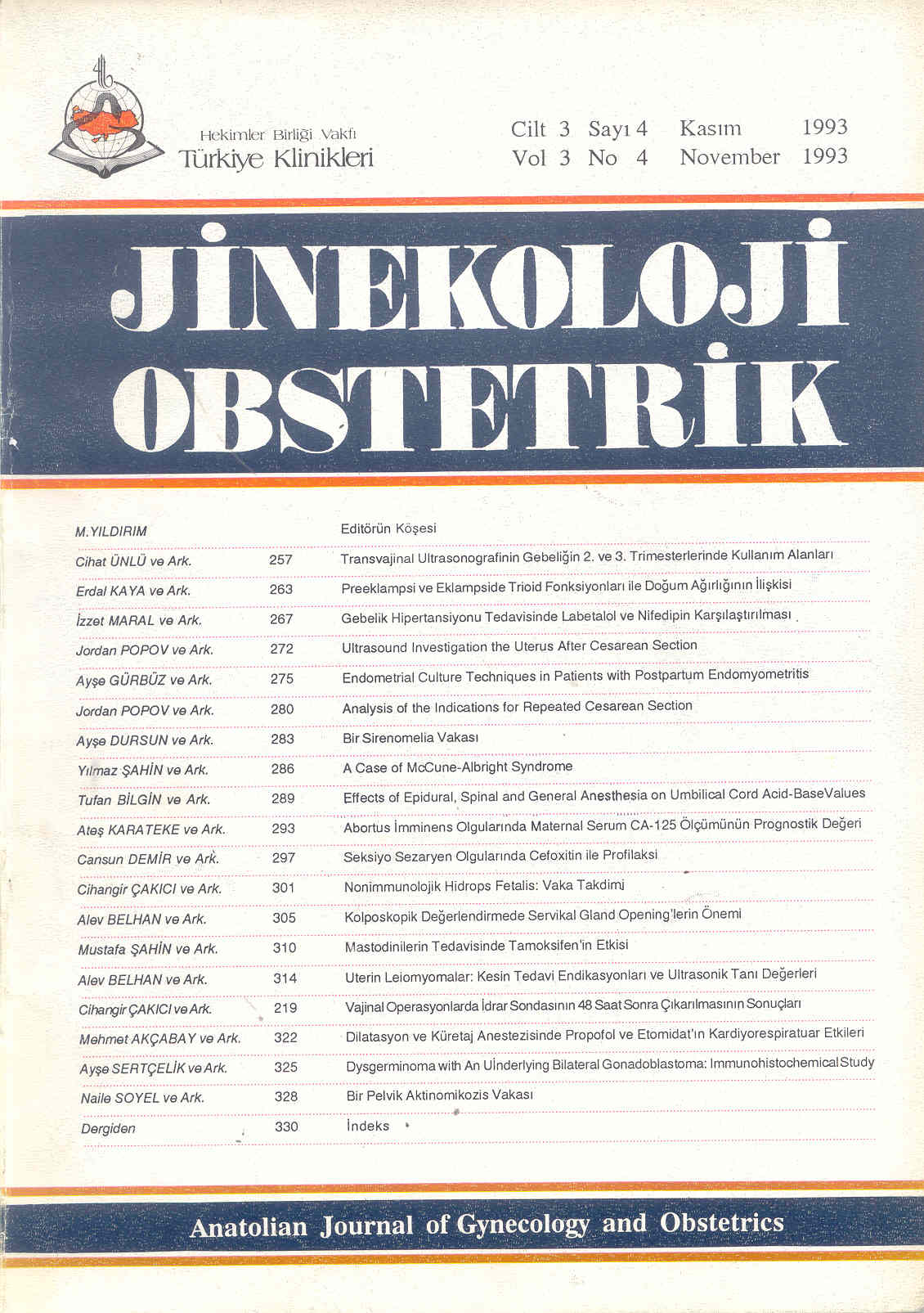Open Access
Peer Reviewed
ARTICLES
3106 Viewed1208 Downloaded
Uterine Leiomyomas: The Endications Of Definitive Treatment And The Values Of Ultrasonic Diagnosis
Uterin Leiomyomalar: Kesin Tedavi Endikasyonları ve Ultrasonik Tanı Değerleri
Turkiye Klinikleri J Gynecol Obst. 1993;3(4):314-8
Article Language: TR
Copyright Ⓒ 2025 by Türkiye Klinikleri. This is an open access article under the CC BY-NC-ND license (http://creativecommons.org/licenses/by-nc-nd/4.0/)
ÖZET
Uterin leiomyoma tanısı konmuş 254 vakaya kanama, ağrı ve bası endikasyonları ile kesin tedavi uygulanmıştır. 244 vakaya adnekslerle birlikte histerektomi, 10 vakaya da myomektomi yapılmıştır. Vakalar fizik muayene sonucunda tesbit edilen uterus büyüklüklerine göre 3 gruba ayrılmış olup, 1. grupta (89 vaka) 10 haftalık gebelik cesametinden daha küçük, 2. grupta (127 vaka) 10-12 haftalık gebelik cesametinde, 3. grupta (38 vaka) ise 12 haftadan daha büyük leimyomalı uteruslu olan vakalar yer almıştır. Çalışmamızda sırasıyla %63.8 ve %34.6 oranlarında görülen kanama ve ağrı semptomunun uterin leiomyomanın büyüklüğü ile ilişkisi olmadığı saptanmıştır (p< 0.05). %1.6 insidensi ile görülen basıya ait semptomlara ise 10 haftadan küçük leiomyomalı uteruslarda rastlanılmamıştır. Buna karşın leiomyomatö uterus cesametinin büyümesi ile paralel olarak 2. ve 3. gruplarda sırasıyla %0.8 ve %7.9 oranlarında bası belirtileri saptanmıştır. Vakalarımızın ultrasonik sonuçlarında %87 doğruluk, buna karşın %8.3 yanlış negatiflik ve %4.7 hata oranı tesbit edilmiştir. Malignitenin olmadığı serimizde, operasyon spesmenlerinin patolojik incelemeleri vakaların hepsinde uterin leiomyomayı teyit etmiştir. Myomektomili 4 nullipardan 2'si operasyondan 14 ve 20 ay sonra gebe kalarak terme ulaşmış ve sezaryan ile doğum yapmışlardır. Malignitenin olmadığı serimizde, operasyon spesmenlerin patolojik incelemeleri vakaların hepsinde uterin leiomyomayı teyit etmiştir.
Uterin leiomyoma tanısı konmuş 254 vakaya kanama, ağrı ve bası endikasyonları ile kesin tedavi uygulanmıştır. 244 vakaya adnekslerle birlikte histerektomi, 10 vakaya da myomektomi yapılmıştır. Vakalar fizik muayene sonucunda tesbit edilen uterus büyüklüklerine göre 3 gruba ayrılmış olup, 1. grupta (89 vaka) 10 haftalık gebelik cesametinden daha küçük, 2. grupta (127 vaka) 10-12 haftalık gebelik cesametinde, 3. grupta (38 vaka) ise 12 haftadan daha büyük leimyomalı uteruslu olan vakalar yer almıştır. Çalışmamızda sırasıyla %63.8 ve %34.6 oranlarında görülen kanama ve ağrı semptomunun uterin leiomyomanın büyüklüğü ile ilişkisi olmadığı saptanmıştır (p< 0.05). %1.6 insidensi ile görülen basıya ait semptomlara ise 10 haftadan küçük leiomyomalı uteruslarda rastlanılmamıştır. Buna karşın leiomyomatö uterus cesametinin büyümesi ile paralel olarak 2. ve 3. gruplarda sırasıyla %0.8 ve %7.9 oranlarında bası belirtileri saptanmıştır. Vakalarımızın ultrasonik sonuçlarında %87 doğruluk, buna karşın %8.3 yanlış negatiflik ve %4.7 hata oranı tesbit edilmiştir. Malignitenin olmadığı serimizde, operasyon spesmenlerinin patolojik incelemeleri vakaların hepsinde uterin leiomyomayı teyit etmiştir. Myomektomili 4 nullipardan 2'si operasyondan 14 ve 20 ay sonra gebe kalarak terme ulaşmış ve sezaryan ile doğum yapmışlardır. Malignitenin olmadığı serimizde, operasyon spesmenlerin patolojik incelemeleri vakaların hepsinde uterin leiomyomayı teyit etmiştir.
ANAHTAR KELİMELER: Uterin leiomyoma, ultrasonik tanı (UST)
ABSTRACT
Two hundred fifty four cases diagnosed as uterine leiomyoma were applied the definitive treatment for bleeding, pain and pressure. In 244 cases hysterectomy with the adnexa and in 10 cases myomectomy were performed. All the cases were divided into the 3 groups according to the uterine size which was established on physical examination. In group 1, the cases (89) have a leiomyomatous uterus smaller than 10 weeks gestation size. Group 2 included 127 cases whose uterus was found to be 10-12 weeks, and there were 38 cases in group 3 having an uterus larger than 12 weeks gestation size. In our study, the symptoms of bleeding and pain were found 63.8% and 34.6% respectively. However, significant assosiation between these symptoms and the size of uterine leiomyoma was not found (p< 0.05). Although pressure-related symptoms was seen in 1.6% of the cases, evidence of pressure was not established in ones whose uteine size smaller than 10 weeks. Whereas in group 2 and group 3 pressure-related symptoms were seen, with the rates of 0.8% and 7.9% respectively, closely related to the leiomyomatous uterin size. The accuracy of ultrasonic diagnosis was 87% whereas false negativity and mistaken were confirmed respectively as 8.3% and 4.7 in this study. Two of the four nulliparas who underwent myomectomy, became pregnant 14 and 20 months after the operation, uneventfully reached the term and delivered with cesarean section. In our presented series there were no malignancy. Pathological examination of the surgical specimens revealed the uterine leiomyoma in all the cases.
Two hundred fifty four cases diagnosed as uterine leiomyoma were applied the definitive treatment for bleeding, pain and pressure. In 244 cases hysterectomy with the adnexa and in 10 cases myomectomy were performed. All the cases were divided into the 3 groups according to the uterine size which was established on physical examination. In group 1, the cases (89) have a leiomyomatous uterus smaller than 10 weeks gestation size. Group 2 included 127 cases whose uterus was found to be 10-12 weeks, and there were 38 cases in group 3 having an uterus larger than 12 weeks gestation size. In our study, the symptoms of bleeding and pain were found 63.8% and 34.6% respectively. However, significant assosiation between these symptoms and the size of uterine leiomyoma was not found (p< 0.05). Although pressure-related symptoms was seen in 1.6% of the cases, evidence of pressure was not established in ones whose uteine size smaller than 10 weeks. Whereas in group 2 and group 3 pressure-related symptoms were seen, with the rates of 0.8% and 7.9% respectively, closely related to the leiomyomatous uterin size. The accuracy of ultrasonic diagnosis was 87% whereas false negativity and mistaken were confirmed respectively as 8.3% and 4.7 in this study. Two of the four nulliparas who underwent myomectomy, became pregnant 14 and 20 months after the operation, uneventfully reached the term and delivered with cesarean section. In our presented series there were no malignancy. Pathological examination of the surgical specimens revealed the uterine leiomyoma in all the cases.
MENU
POPULAR ARTICLES
MOST DOWNLOADED ARTICLES





This journal is licensed under a Creative Commons Attribution-NonCommercial-NoDerivatives 4.0 International License.










